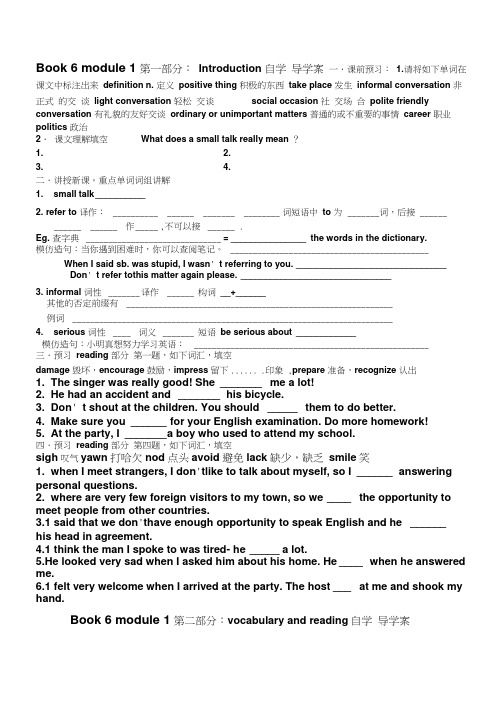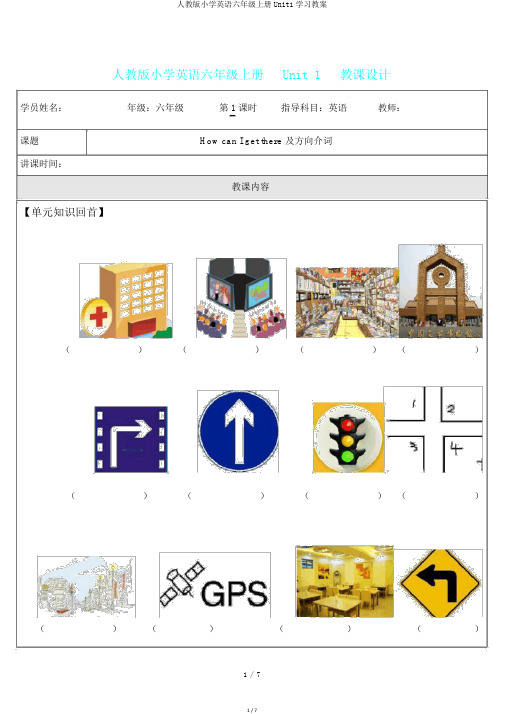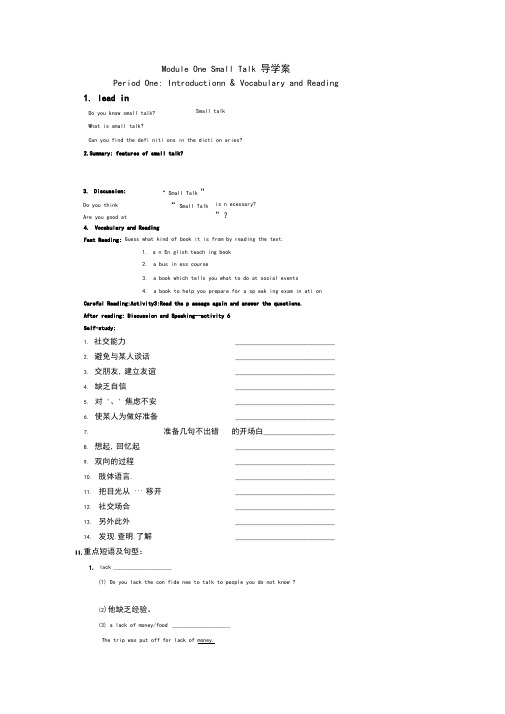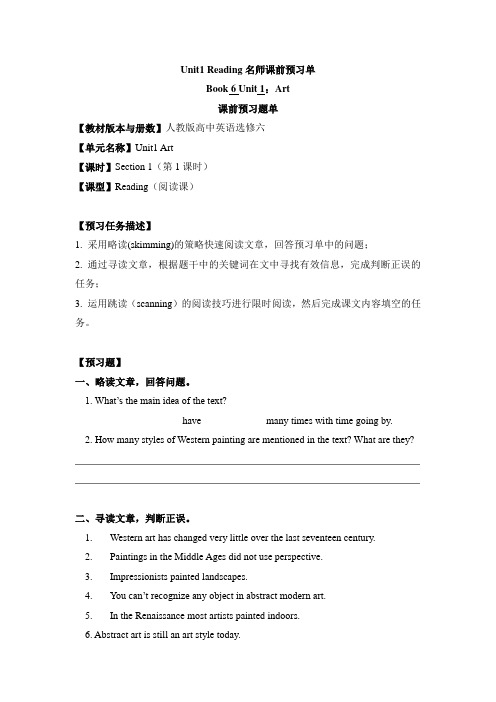人教修订book6 Unit 1 预习学案
- 格式:doc
- 大小:116.50 KB
- 文档页数:9

Book 6 module 1 第一部分:Introduction 自学导学案一.课前预习:1.请将如下单词在课文中标注出来definition n. 定义positive thing 积极的东西take place 发生informal conversation 非正式的交谈light conversation 轻松交谈social occasion 社交场合polite friendly conversation 有礼貌的友好交谈ordinary or unimportant matters 普通的或不重要的事情career 职业politics 政治2.课文理解填空What does a small talk really mean ?1. 2.3. 4.二.讲授新课。
重点单词词组讲解1. small talk __________2. refer to 译作:__________ ______ _______ ________ 词短语中to 为_______ 词,后接____________ ______ 作_____ ,不可以接______ .Eg. 查字典______________________________ = _______________ the words in the dictionary.模仿造句:当你遇到困难时,你可以查阅笔记。
____________________________________________ When I said sb. was stupid, I wasn' t referring to you. ______________________________Don' t refer tothis matter again please. ______________________________3. informal 词性_______ 译作 ______ 构词__+______其他的否定前缀有 ___________________________________________________________例词_______________________________________________________________________4. serious 词性____ 词义_______ 短语be serious about ____________模仿造句:小明真想努力学习英语: ____________________________________________________三.预习reading 部分第一题,如下词汇,填空damage 毁坏,encourage 鼓励,impress 留下...... .印象 ,prepare 准备,recognize 认出1. The singer was really good! She _______ me a lot!2. He had an accident and _______ his bicycle.3. Don' t shout at the children. You should _____ them to do better.4. Make sure you ______ for your English examination. Do more homework!5. At the party, I _______ a boy who used to attend my school.四.预习reading 部分第四题,如下词汇,填空sigh叹气yawn打哈欠nod点头avoid避免lack缺少,缺乏smile笑1. when I meet strangers, I don'tlike to talk about myself, so I ______ answering personal questions.2. where are very few foreign visitors to my town, so we ____ the opportunity to meet people from other countries.3.1 said that we don'thave enough opportunity to speak English and he ______ his head in agreement.4.1 think the man I spoke to was tired- he _____ a lot.5.He looked very sad when I asked him about his home. He ____ when he answered me.6.1 felt very welcome when I arrived at the party. The host ___ at me and shook my hand.Book 6 module 1 第二部分:vocabulary and reading自学导学案一.课前预习:1.请将如下单词在课文中标注出来Cross 穿过 avoid 避免 recognize 认出 confidently 自信地 guest 客人 lack the confidence 缺少自信advance planning 预先准备 prepare 准备 low-risk conversation opener 是低风险的开场白 damage 毁坏 develop 提 高 a two-way process 双向的过程involve 涉及 impress 留下 ... .印象 encouraging noise and gestures 鼓励的声音或姿势 contact 接触 yawn 打哈欠 sigh 叹气 in addition 除此之外host 主人 a certain color 一种特定颜色二•课文理解填空1. Read the passage and decide what kind of book it is from. Choose from. Choose from this list. (阅读课文,确定本文是出自什么样的书籍,从如下选项中选出) ______________ 1. an English teaching book2. A business course3. A book which tells you what to do at social events4. A book to help you prepare for a speaking examination2. 将文章八自然段分成四部分,并概括段意 (提示,注意副标题)5. 读最后一部分(找出不同文化下的一些社交规则)(1)(2) (3)(4)6. 阅读课文回答课后第三题 3. 读课文第二部分,回答那些话题是低风险的开场白(1)(2) (3)(4) 4.1. According to the article, should people plan what they' re going to say atparties?2. What do people think about those who talk too much?3. Describe two things you shouldn t do in a conversation.4. Why is it a good idea to nod and smile when the other person is talking?5. What does the quotation from Benjamin Disraele tell you about people? 三.重点单词词组讲解1. __________________ damage 词性 ____ 词义____________________________________ 对造成损害模仿造句:饮酒太多会损害你的健康________________________________________________ 地震对四川人们造成巨大损害 ___________________________________________2. impress 短语:sb be impressed with _______________模仿造句:我对老师所说的话印象深刻______________________________________________sth be impressed on one 's mind ___________________模仿造句:老师说的话深深地印在我的脑海里________________________________________3. make sure ______________________ Make sure of / about ___________Make sure that ________ 模仿造句:你一定要确保明白我的话________________________模仿造句:我们必须确保孩子们的安全(safety) _______________________________4. confidently 词性 __ 词义 _____ adj. _______________ n. _________________5. make friends with ________________________________________模仿造句:我发现与你交朋友很难__________________________________________________6. lack 词性: ______ 词义:_______模仿造句:他们没钱送她上大学:__________________________________________For lack of : _________ 模仿造句:由于缺钱,我不能买那套房子:___________________Be lacking in: _________ 模仿造句: 他缺少信心: ___________________ = ________________A lack of _______________ 模仿造句:缺钱、水_____________________7. be nervous about _________________________模仿造句:你知道他为什么紧张不安吗?________________________________________________7. advance:词性:___ 词义: ___________ advanced 词性:_____词义: ____________模仿造句:如果你能来,请事先通知我们________________________________________她总是有先进的想法: ____________________________________________8. think of ________________ think highly of _____________think nothing of ____________ think of …as … _________________模仿造句:我正在考虑换工作 ____________________________________9.look away from ___________模仿造句:当老师讲课时,不要把目光移开她________________________________________10.in addition ______________ = _______________ 作______ 词In addition to ______________ = _____________ 相当于_______ 词Book 6 module 1 第三部分:Grammar复习情态动词+have done 结构1. didn ' t have don表示过去______ 做某事,事实上_______2. needn' t have done^示过去______ 做某事,但事实上____________ .3. couldn ' c t an' h t ave done 表示过去____________ ,也可以理解为对过去事实的________ 猜测。

教师学科教案[ 20 – 20 学年度第__学期]任教学科:_____________任教年级:_____________任教老师:_____________xx市实验学校预习导学教学案九年级英语主备人授课时间______ 课型:新授课课时______课题Module6 Unit 1 It's wasteful to throw away glass, paper andmetal.教学目标 1.能正确运用本单元重点单词及短语。
2.能熟练朗读对话,正确回答问题,并就保护环境的话题进行对话练习。
3.理解及使用派生词,利用构词法理解一些生词意思。
重点 Aim I and Aim III 难点AimII【预习任务展示设计】一、自学本课新单词及短语并大声朗读背诵。
waste——a waste of time \we don't waste electricity.wasteful \throw away——It's wasteful to throw away glass, paper and metal. metal——The chair is made of medal. energy——save energy pollution——think about pollution and recyclingrecycle——Recycle means "change things into something else".reader——a reader of our New Standardenvironmental——environmental educationreusable——collect reusable wastehopeless——If we don't, the future is hopeless.二、熟读本单元活动3对话,并完成活动4。

人教版小学英语六年级上册Unit 1 教课设计学员姓名:年级:六年级第1课时指导科目:英语教师:课题How can I get there 及方向介词讲课时间:教课内容【单元知识回首】()()()()()()()()()()()()()()()要点单词和句型的解说:Where 指引的特别疑问句;是用来对地址进行咨询。
基本构造为:Where + is/ are +主语?回答:It is / They are +介词 +地址。
Eg : ---Where is your school? 你的学校在哪里?----It ’s near the bookstore.在书店的邻近。
练一练:学生们在哪儿?他们在教室里。
表示感谢的“感谢”1. Thanks a lot 特别感谢Many thanks多谢Thank you very much. 特别感谢。
Thank you all the same.仍旧感谢你。
Tips:当他人向我们表达感谢时;我们能够说:You’want to do sth 想要做某事Eg : I want to open the window. 我想要开窗。
表示想要;还能够用“would like ;”常用句型为: Would you like.?练一练:我想要一本漫画书。
你想要一些果汁仍是咖啡?Excuse me常.用作与陌生人开始发言或许是打搅他人时的礼貌用语;常有用法以下:惹起他人的注意;如问路或许咨询姓名Excuse me; is there a hospital near here? 恳求允许Excuse me. May I use your pen ?打断他人的发言Excuse me. I must go now.Eg:. Where is the bookstore; please?; I don t ’know.A . Excuse me B. Sorry喜爱“ like的”用法1.like +名词 /代词意为“喜爱某物或许某人”2.like + doing sth 意为“喜爱做某事”;常用来描绘喜好或许习惯;Eg: Do you like my new bike? 你喜爱我的新自行车吗?I like playing football but I don ’tlike playing the piano.我喜爱踢足球;可是我不喜爱弹钢琴。

Module One Small Talk 导学案Period One: Introductionn & Vocabulary and Reading1. lead inDo you know small talk?What is small talk?Can you find the defi niti ons in the dicti on aries?2.Summary: features of small talk?3. Discussion:Do you thinkAre you good at“ Small Talk ” “ Small Talk 4. Vocabulary and ReadingFast Reading: Guess what kind of book it is from by reading the text.1. a n En glish teach ing book2. a bus in ess course3. a book which tells you what to do at social events4. a book to help you prepare for a sp eak ing exam in ati onCareful Reading:Activity3:Read the p assage again and answer the questions.After reading: Discussion and Speaking —activity 6Self-study:1.社交能力 _________________________ 2.避免与某人谈话 _________________________ 3.交朋友,建立友谊 _________________________ 4.缺乏自信 _________________________ 5.对 '、' 焦虑不安 _________________________ 6.使某人为做好准备 _________________________ 7.准备几句不出错 的开场白 __________________ 8.想起,回忆起 _________________________ 9.双向的过程 _________________________ 10.肢体语言. _________________________ 11.把目光从 ''' 移开 _________________________ 12.社交场合 _________________________ 13.另外此外 _________________________ 14. 发现.查明.了解_________________________ II.重点短语及句型:1. lack ____________________(1) Do you lack the con fide nee to talk to people you do not know ?(2)他缺乏经验。

Unit1 Reading名师课前预习单Book 6 Unit 1:Art课前预习题单【教材版本与册数】人教版高中英语选修六【单元名称】Unit1 Art【课时】Section 1(第1课时)【课型】Reading(阅读课)【预习任务描述】1. 采用略读(skimming)的策略快速阅读文章,回答预习单中的问题;2. 通过寻读文章,根据题干中的关键词在文中寻找有效信息,完成判断正误的任务;3. 运用跳读(scanning)的阅读技巧进行限时阅读,然后完成课文内容填空的任务。
【预习题】一、略读文章,回答问题。
1. What’s the main idea of the text?_____________________ have ____________ many times with time going by.2. How many styles of Western painting are mentioned in the text? What are they? _____________________________________________________________________ _____________________________________________________________________二、寻读文章,判断正误。
1. Western art has changed very little over the last seventeen century.2. Paintings in the Middle Ages did not use perspective.3. Impressionists painted landscapes.4. You can’t recognize any object in abstract modern art.5. In the Renaissance most artists painted indoors.6. Abstract art is still an art style today.三、跳读文章,短文填空。

(眼睛)瞄准力求达到 针对(2)aim to do sth./aim at doing sth.意欲/企图做某事, 旨在做某事 be aimed at 目的是,旨在,针对 (主语一般是物) be intended to do/for sth. be designed to do/for sth. (同词异构:目的是,旨在)be meant to do /for sth. achieve one’s aim 达到目的 without aim 漫无目的地(1) take aim at 向……瞄准= aim at sth. miss one’s aim 打不中目标,达不到目的 with the aim of 以期……,意在……aim 瞄 准 基本义一、词汇变形Book6 Unit1 Art词汇导学案1. realistic (adj.) 现实的--- real (adj.) ---really (adv.)---reality (n.) ---realize (v.)2. faith (n.) 信心--- faithful (adj.) --- faithfully3. aim (v./n.)---aimless (adj.)---aimlessly(adv.)4. possess (v.) 拥有--- possession (n.)5. predict (v.) 预言--- prediction (n.)6. exhibit (v.) 展出 --- exhibition (n.)7. school--- scholar (n.) 学者--- scholarship8. prefer (v.) 更喜欢--- preferred --- preference(n)8. appeal (v.) 呼吁/ 有吸引力 --- appealing(adj)10. convention(n)习俗; 常规---conventional(adj.)---unconventional(adj.) 11. type(v./n.)---typical(adj.)典型的12.evident(adj.)---evidence(n)证据 13. possess(v.)---possession(n.)财产 14. impress (v.)---impressive(adj.) ---impression(n.)---impressionism(n.) 二、重点单词1.aim v ---impressionist(n.)印象派艺术家 16. critic(n.)评论家---criticize(v.)批评 ---criticism(n.)批评---critical(adj.)批评的,关键的16.carve(v.)雕刻---carving(n.)雕刻品17.effect(n)效果,影响 ---effective(adj)---effectively19. circular(adj.)圆形的---circle(n./v.)圆/盘旋 ---circulate(v.)循环,流传---circulation(n) 20. civil(adj.)国内的---civilize(v.)使文明 ---civilized(adj.)---civilization(n.)文明 21. view(v.)看---vision(n.) 视野 ---visual (adj.)视觉的 22. signature(n.)签字,署名 ---sign(n./v.)标记牌/签字23. adopt(v.)采纳,收养---adoption(n.) 24. specific(adj.)---specifically(adv.) 25. aggressive(adj.)---aggression(n.)侵略 ---aggressiveness(n.)进取精神Denver aimed his gun but did not shoot. The company is aiming at training everybody.*The program aimed at teenagers is well received.take aim at ); 目标,目的(achieve/realize one ’s aim; mi ss one ’s aim)1)*This activity ______(旨在) improving the students’ ability of listening and speaking.2)These educational courses are aimed ___ older people.3)The measures are aimed at ___(prevent) violence.appeal to sb. for sth 呼吁某人做…(call on sb. to do sth.) appeal for mercy 恳求宽恕make/launch an appeal to sb. for sth. 呼吁某人… appeal for aid/help 恳求帮助sth. appeal to sb.吸引某人 (= have appeal for sb. ) lose/drop an appeal 上诉失败/撤诉have hold wide /popular appeal 广受欢迎2. shadow n[C] 影子 When the sun is low, the grand building casts its shadow right across the city. (具体-抽象)阴影/影响 These people have been living for years under the shadow of fear. shadow VS shadeshade 指阳光照不到的地方,如树下或墙边的阴凉处,一般没有具体的轮廓。
五年级Book6unit1教案english book 6编写者:fsf执教者:执教时间:年月日(周)课题unit 1 a1共课6时教学目标say the words eat breakfast, do morning exercises, have english class, play sports, eat dinner.say the sentences when do you do morning exercises/…? i usually…at…say the chant freely.gave correct response to the words learned. show say point write.教学重点教学难点eat breakfast, do morning exercises, have english class, play sports, eat dinner.when do you do morning exercises/…? i usually…at…教学准备recorder picture wore cards hanging chart a big clock教学过程l warmerstep 1 greetingsstep 2 sing a chant what do you do on saturdays? ( book 5 unit 2 b)step 3 game: what time is it?t: what time is it? a: it’s….l presentationgame: look and do.look at the picture, then do it.play ping-pong/football, play computer games, paint, watch tv, read books, do homework/housework.let’s learn.1). ss do morning exercises. t: can you do morning exercise? (eye exercise)s: yes, i can.2). s do sports. ask ssguess, what does he doing?t: yes, you’re right. we can play…we can play sports. you play sports every day. can you do sports?3). draw sun and moon.t: i eat breakfast at 7:00 in the morning. i eat dinner at 8:00 in the evening.game: t: i eat dinner. ss: at 8:00 in the evening….4). t: we have english class. mr xu is here, i have chinese class.5). teach the new sentences: it’s on the first floor.play the vcd of the words. the children listen and follow in their books. teach the new words.l practice1. game. walk to the new words. a: i usually do morning exercise at 8:00.b walk to the word usually.2. let’s start..look and say.t: what time is it?s: it’s six o’clock.t: i usually get up at 6:00 in the morning. when do yu get up?s:….when do you get up? when do you eat breakfast?when do you go to school? when do you do homework?when do you go to school? when do you watch tv?when do you eat lunch? when do you go to bed?when do you have chinese class?3. let’s chant.say the chant freely.4. good to know.explain clean your hands, brush your teeth. before, rules to follow every day.共7页,当前第1页1234567l assessmentactivity book.1. look and say.2. listen and match.3. let’s chick.l add-activitiesuse the sentences at home. say the chant athome.draw some picture about your school. 修改意见教后反思english book 6编写者:fsf执教者:执教时间:年月日(周)课题unit 1 a2共课6时教学目标say the sentences when do you get up/eat breakfast/…? i usually…at…use the words correct usually, often sometimestalk about the timetable freely.教学重点教学难点words: usually, often sometimessentences: when do you get up/eat breakfast/…? i usually…at…paint: design a timetable about your parents.教学准备教学过程l warmerstep 1 greetingsstep 2 say the chant what do you do on the weekend? step 3 let’s plays make movements and the others guess what does he do?l presentation1. let’s try.amy: mike, when do you get up?mike: i usually get up at 6:30.amy: when do you eat breakfast?milk: at 6:50.amy: when do you go to school?milk: at 7:20.zip: which is milk’s timetable.2. let’s talk.free talk.i get up at …i eat breakfast at…i go to work at…t show the timetable.t: this is my timetable. do you want to know the time? ask me please.3. play the vcd of the dialogue. thechildren listen and follow in their books. 4. read the dialogues with recorder.l practice1. let’s find outask and answer about the timetable. how do you make your timetable better?2. encourage them to make their parents timetable, glue it on the board. ask and answer the timetable.l assessmentactivity book.1. look and say.2. check the answerl add-activitiesuse the sentences at home.make some nice clothes to your friends.共7页,当前第2页1234567thinking: who is the busiest one in my family?report: my day 修改意见教后反思english book 6编写者:fsf执教者:执教时间:年月日(周)课题unit 1 a3共课6时教学目标learn to write the words board, light, fan, computer.write the sentences correct. when do you eat dinner? i eat dinner at 7:00 in the evening. when do you get up? i usually get up at 12:00 at noon.pronunciation: ai, ay, gr, glpractice the ss’listening skills and speaking skills.教学重点教学难点hand writing: when do you eat dinner?i eat dinner at 7:00 in the evening. when do you get up? i usually get up at 12:00 at noon.pronunciation: ai, ay, gr, gl教学准备mask recorder picture wore cards hanging chart教学过程l warmerstep 1 greetingsstep 2 say the sentences, let’s talk. step 3 let’s plays make movements and the others guess what does he/she do? step4 report: my day step 5make a survey talk about the timetable.l presentation1. listen to the recorder: read and write.what the truth?i get up at 6:00. i go to bed at 7:00….ask ss find the wrong sentences.2. t: you’re right. i don’t go to bed so late. i go to bed before 11:00. but some people really go to bed at 7;00 in the morning. do you know why? who are they? let’s go and see.show the picture and say .ask the pre-story questions. guide them to find the answers by looking at the pictures and words the know.when does the policeman go to work/eat…/go to bed/play sports? let’s read the dialogue.teach the new sentences: policeman, can i ask you some questions? thank you for telling me about your day.3. finish the sentence.4. write the sentences.l practice1. show the talk.spell the words.2. listen and repeat.3. pronunciation: ai, ay, gr, glai: mail sail tail wail againay: day away always stay paygr: grandma grey greet ground groupgl: glow gloom globe glkossl assessmentactivity book.a) read and write.共7页,当前第3页1234567b) write the wordson the note bookc) check.l add-activitiesinvite a doctor make a survey.make a report: …’s day 修改意见教后反思english book 6编写者:fsf执教者:执教时间:年月日(周)课题unit 1 b1共课6时教学目标say the words climb mountains, go shopping, play the piano, visit grandparents, go hiking.sing the song weekendlearn to use the base sentences freely.教学重点教学难点words: climb mountains, go shopping, play the piano, visit grandparents, go hiking.sentences: what do you do on the weekend?song: weekend 教学准备教学过程l warmerstep 1 greetingsstep 2 sing the song. weekendstep 3 ask and answer about the picture book.t: i often…on saturdays.s: what do you do on…?…l presentation1. b let’s chant.t: they’re my parents. i often visit my parents on the weekend. do you often visit your grandparents?s: i visit my uncle/aunt…on the weekend.teach the new words.2.a. i miss my grandparents very much. but i can’t visit my grandparents this weekend, because i’m too busy. i think i can visit them next weekend.we can climb mountains together. draw a mountain and play a game.b. we can also go hiking on the weekend.c. how nice it is! but it’s too clod in the mountains. let’s buy a warm coat. let’s go shopping.d. what’s this? do you play the piano on the weekend? can you play the piano?play the recorder or read the dialogue. the children listen and follow in their books. ask the children to look carefully at the picture on this spread. repeat the new words.l practice5. game. gossipt show the picture on the board, make movements and guess.2. guessing game.i climb mountains on the weekend….3. play the vcd of song. pause after each dialogue and perform an actions to aid comprehension, e.g.l assessmentactivity book.4. look and say.5. let’s chick.6. say the story at home.共7页,当前第4页1234567l add-activitiesuse the sentences at home. 修改意见教后反思english book 6编写者:fsf执教者:执教时间:年月日(周)课题unit 1 b2共课6时教学目标say the sentences what do you do on the weekend? i usually/often play football. sometimes i go hiking.learn to use the base sentences freely.教学重点教学难点sentences: what do you do on theweekend? i usually/often play football. sometimes i go hiking.教学准备教学过程l warmerstep 1 greetingsstep 2 say the chant a, bstep 3 daily dialogueswhat do you do on the weekend?l presentation1. t: i go hiking/…on the weekend. what do you do on the weekend? how many of you go hiking/…?please put up your hands.2. let’s try.amy: what do you do on the weekend, mike?mike: on saturday, i read books. i do homework. on sunday, i go shopping. i watch tv. what about you, zhang peng?zhang: on saturday, i do homework. i play the piano. on sunday, i go shopping. and, i visit my grandparents.t: what do you do on the weekend?s: i usually/often/sometimes….2. watch the vcd of the talk.2. teach the new sentences: what do you do on the weekend? i usually/often play football. sometimes i go hiking.3. repeat. this time pause for the children to carry out the indicated dialogues.l practice1. practice: what do you do on the weekend? i usually/often play football. sometimes i go hiking.6. let’s find out..what do you do on the weekend?i usually on the weekend. sometimes i . i can with . i can with .3. thinking: how can you have a happy weekend?l assessmentactivity book. xkb15.say the story to each other..6. let’s check.3. story time.l add-activities 共7页,当前第5页1234567say the story at home. 修改意见教后反思english book 6编写者:fsf执教者:执教时间:年月日(周)课题unit 1 b3共课6时教学目标learn to write teacher’s desk, picture, floor, wallwrite the sentences: what do you do on the weekend? usually i watch tv and go shopping. sometimes i visit my grandparents. i often play football. sometimes i go hiking.read the sentences the weather report says it’s going to rain tomorrow. i can’t play football in the rain. i can’t go hiking, either.practice the ss’listening skills and speaking skills.教学重点教学难点words: teacher’s desk, picture, floor, wallsentences: what do you do on the weekend? usually i watch tv and go shopping. sometimes i visit my grandparents. i often play football. sometimes i go hiking. the weather report says it’s going to rain tomorrow. i can’t play football in the rain. i can’t go hiking, either.教学准备教学过程l warmerstep 1 greetingsstep 2 sing the song weekendstep 3 let’s findually i watch tv and go shopping. sometimes i visit my grandparents.ask ss find the words. l presentation1. show the magic lantern, read and write.t: these are zip’s weekend activities. those are zoom’s weekend activities. look at the pictures carefully. what can they do on the weekend?2. play the recorder or read the dialogue. the children listen and follow in their books.the weather report says it’s going to rain tomorrow. i can’t…i can’t…either. let’s watch tv together. s: good morning. it’s fine today. but it’s going to rain tomorrow.t: what do you do on the weekend?s: i usually play football. sometime i….t: the weather report says it’s going to rain tomorrow.s: oh, dear! i can’t ….i can’t either.t: let’s ….s: ok.3. ask the pre-story questions. guide them to find the answers by looking at the pictures and words the know, spell the new words.l practice1. let’s check.write down sandy’s day.2. i am sandy. i get up at 6:40. i do morning exercises at 7:00. i eat breakfast at 7:20. i go to school at 7:40. classes begin at 8:00. i eat lunch at 11:40. i play sports at 4:00. i go home at :00. i eat dinner at 6:30. i go to bed at 8:30.共7页,当前第6页1234567circle her weekend activities.woman: what do you do on the weekend, sandy?sandy: i usually visit mygrandparents. sometimes i go hiking.woman: circle her weekend activities.l assessmentactivity book.1. look and write.2. check. i. add-activitiesmake a dialogue: when do you…? what do you do on the weekend?say the letters to your parents.修改意见教后反思11————来源网络整理,仅供供参考。
Part 1 A short history of western paintingPeriod2 语言知识运用(导学案)编制:单发祥老师郭蕴慧老师张凤娟老师王亭亭老师王倩老师审核:李博老师使用日期:第8周第4课时Name ______________ Num. _______ Group _______ Class _______ 教师评价________ 【Learning aims学习目标】1. Able to memorize the 5words (faith, consequently, adopt, possess. coincidence), 3phrases (a great deal, on the other hand, as well as) and 1 sentence patterns (It is typical of sb. to do sth.) in this period.the 2 words ( aim, attempt) and 2 sentence patterns(It+be+adj+主语从句;倒装句)and use them flexibly(be active and enjoy the pleasure of learning English and challenging yourself through self-directed study and cooperation.【Instructions使用说明】1.本节课覆盖课本(P1-P3)),侧重语言知识运用能力的培养。
2.请使用荧光笔将本课的7个词汇、3个重点短语和3个句式(见上面的【学习目标】)标划于课本。
3.《非常学案》上指定的练习和预习案中的【预习检测】,并背诵划双下划线的经典例句。
4.本单元语言点课之后将考点整理在笔记本上,将错题整理在纠错本上,在早读时熟读背诵。
5.25分钟独立、按时完成导学案之“课前预习案”部分,并以小组为单位上交。
英语人教新起点六年级上册-Unit6 Winter Vacation(Lesson1)导学案课程目标1.通过本课的学习,学生能够学会描述自己在寒假中的一些活动和体验;2.学生能够了解寒假在不同国家和地区的庆祝方式和习俗;3.学生能够听懂、掌握并正确运用本课所学的单词和短语。
课前预习1.根据学生自己的学习进度,提前预习本课的重点内容,熟记本课的单词、短语及句式结构。
2.通过找一些关于寒假的图片、文章和视频,了解不同国家和地区的寒假庆祝方式和习俗。
课堂学习Step1. 课前热身1.学生自我介绍,并描述自己在寒假中做了哪些事情。
2.老师介绍了课堂上将要学习的主题,即寒假的庆祝方式和习俗。
同时向学生提问:在你的印象中,除了新年,寒假还有哪些节日和庆祝活动?Step2. 听力和口语训练1.听老师介绍关于寒假庆祝方式的英文短文,并根据听力材料进行口语练习。
Winter vacation is coming! Many families have some new tradition o f celebrating winter break. In some areas, people usually eat Dumplings, or jiaozi in Chinese. In other areas, people may have some special meal s or parties. In Japan, most families have to clean their house and deco rate with special ornaments. Winter vacation is a good time to spend wit h family and friends.2.学生请跟读英文短文,并注意单词发音和句子语调。
3.小组讨论:学生在小组内分享自己在寒假中的庆祝方式和习俗,并请其他组员发表意见以及通过英语来描述他们的经历。
选修六Unit1 学案课时一重点单词:1.adopt vt. 采用;采纳;收养adoption n.采用;收养用法归纳:2.aim n. 目标;目的v. 瞄准;向某方面努力We aim at quality rather than quantity. 我们力求质量而不是数量。
He aimed to swim a mile. 他的目标是游一英里。
She went to London with the aim of finding a job.The activity is aimed at improving the students’ ability of listening and speaking. 2021天津用法归纳:3.possess v t.拥有;具有;支配possession n.拥有, 占有;财产(常用复数) 常用复数的名词:savings n. 储蓄belongings n. 所有物;财产surroundings n.环境He doesn't possess a sense of humorShe was suddenly possessed with fear.Their house and possessions were destroyed in the earthquake.Our army took possession of the enemy’s base.The garden is in the possession of me. = The garden is in my possession. =I’ m in possession of the garden.用法归纳:in possession of拥有……主语为人in the possession of sb./in one’s possession为……所有take possession of拥有,占有4 .faith n.信任;信心;信念faithful adj. 忠诚的faithfully adv. 忠诚地Faith can move mountains. 精诚所至,金石为开。
选修六Unit 1Art预习学案单元知识目标一、重点词汇:动词:aim, adopt, possess, attempt, predict, figure, carve, display, appeal.名词:abstract, sculpture, gallery, faith,aim, possession, perspective, technique, coincidence, shadow, attempt, figure, clay, critic, cafe, exhibition, scholar, flesh, geometry,bunch, avenue, preference, appeal, reputation, district, committee, signature. 形容词:realisti c, abstract, conventional, typical, evident, humanistic, superb, ridiculous, controversial, specific, delicate,allergic, aggressive,fragile,Egyptian, visual, fragrant, contemporary, permanent.副词:faithfully, consequently, effectively, typically.重点短语:by coincidence, a great deal, on the other hand, figure out, in the flesh, appeal to, make an abstract from, have / lose faith in, be faithful to, take aim at, aim to do sth, be aimed at, be conventional in, (be) in possession of, take possession of, convince sb of sth, attempt to do / doing sth, make an attempt to do sth, be specific to, be allergic to, give a preference to, show a preference for, have a good reputation, from one’s perspective, on exhibition, a bunch of.二、重点句型:1)虚拟语气1:“愿望(wish)”类宾语从句I wish I were ten years younger.I would rather prices would come down.He wished he hadn’t done it.2) 虚拟语气2: 含有(虚拟)条件状语从句的虚拟语气:If the rules of perspective had not been discovered, no one would have been able to paint such realistic pictures.If I were you, I would take an umbrella.If he should come here tomorrow, I would talk to him.If she were to be here next Monday, I would tell her about the matter.3)表语提前的完全倒装:Among the painters who break away from the traditional style of painting were the impressionists who lived and worked in Paris.At the next table was a pretty gir l waiting for someone.Present at the meeting were the leading members of the departments concerned.Standing in the doorway was a man with a gun.Buried in the sands was an ancient village.4)不定式作定语:The impressionists were the first painters to work outdoors.The best way to see the paintings is to start from the top floor.三、例句学习:1.It is a realistic sculpture.Stop daydreaming and be realistic.What a realistic looking apple in the picture!2.Abstract sculptures did not appeal to him.Mathematics is concerned with understanding abstract ideas.Astronomy is an abstract subject.Please write an abstract of this article.3.He has great talent, but he has lost his faith.I still have faith in you despite your shortcomings.I have firm faith that you will pass the exam.Mary is faithful to her husband.She has served the family faithfully for thirty years.4.My car broke down and consequently I was late.She was a bright and eager student and, consequently, did well in school.As a consequence of smoking, my father coughs frequently.5.What is your aim in life?Take careful aim at the target before firing.The policeman aimed his gun at the escapee.This non-smoking campaign is mainly aimed at young teenagers.You have to aim at the centre of the target.He aims to be a successful writer.6.It was a conventional war with conventional weapons.After a conventional remarks, he began to deliver his brilliant speech.I wish you weren't so conventional in bringing up your children.7.He signed his name with evident satisfaction.It is evident that he is not equal to the job.We hold the truth to be self-evident, that all men are created equal and independent.8.They adopted new techniques in learning English.She was left an orphan and a poor peasant adopted her.We're willing to adopt your plan.9.Rose is a woman who possesses a rare intelligence.He was found in possession of dangerous drugs.When her father died, she came into possession of a large fortune.He took possession of his new house.The enemy has taken possession of the town for two weeks.10.She's a superb singer.The food is delicious and the service is superb.11.You can get a perspective of the whole city from here.The picture looks strange because it is out of perspective.In my perspective, the plan is far from perfect.12.What a coincidence!Is there any coincidence between his opinions and your own?She and I both arrived at the same time by coincidence.13.This is the most ridiculous thing I've ever heard in my life.You look ridiculous in such a dress.14.This is a controversial district.I'm not replying to this question because it's controversial.15.He is attempting a difficult task.We'll attempt to solve the problem.I attempted walking until I fell over.It's useless to make a further attempt.He made the attempt again and again without success.16.On one hand, I have no time; on the other hand, I have no money.On one hand I have to work; on the other hand I have many visitors to see to.17.What's the specific time of his arrival?He gave us very specific instructions.The picture has a specific style.This disease is specific to this area.18.Will you check these figures?Her income is in five figures.The mass of clay was made into a figure of soldier.He's doing exercises to improve his figure.The girl is skillful at figure skatingI like the color of the hat instead of its figure.I saw a figure approaching me in the darkness.Our textbook has many figures to help explain the lessons.The child is learning to figure.Figure the total and I'll pay it with a check.I figured that you wouldn't come.I can't figure out why he is so allergic to my words.19.The international situation is very delicate at present.Don't grasp at the delicate branch, or you may break it.He has a delicate sense of smell.She is a delicate girl with a delicate skin.Her health is delicate.20.You like cats but unfortunately I'm allergic to them.He is allergic to having his picture taken.He was allergic to housework.21.America has a lot of aggressive weapons now.His style of argument in meetings is much aggressive.He is an aggressive person and likely to start a fight.She is really an aggressive lady.you should be aggressive if you are to succeed.Some people get aggressive after drinking alcohol.22.The pain was almost more than what flesh could take.We are made from flesh and soul.I have seen her on television, but never in the flesh.I saw him very much in the flesh only half an hour ago.23.I bought a bunch of grapes.He gave a bunch of flowers to his girlfriend.A bunch of girls was / were sitting on the grass.24.What is your preference, tea or coffee?A polar bear has a preference for cold weather.In considering people for jobs, we give preference to those with previous experience.25.She will appeal (against) the judge's decision.She has appealed to a higher court.He appealed for his parents' forgivenessHis appeal for forgiveness went unanswered.He eagerly appealed to his friends for support.The government is appealing to everyone to save water.This job rather appeals to me.What she saw appealed to her sense of duty.26.Be careful. This is a fragile box.This glass disk looks very fragile.She has been in fragile health all winter.27.The film is a visual art.Her designs have a strong visual appeal.28.The flowers gave off a fragrant smellThe air in the garden was fragrant.29.My studies were devoted almost entirely to contemporary literature.Shakespeare was not contemporary with Dickens.【用本学案所学句型和词汇翻译以下短语和句子】1.我多么希望我能见到这位杰出的雕塑家本人。